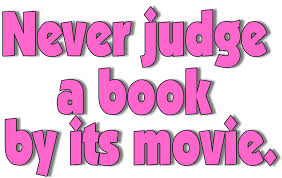
Previous note: All the links are to my Portuguese Blog, so I understand that the majority of our readers aren´t experts in my native language, but if someone wants some kind of translation or help, I´ll be free to provide it.
Inspired by this great post, I decided to write a few lines about the subject.
Thousands of books have already been adapted into movies.
It is thought (although not 100% sure) that Trilby and Little Billee, directed in 1896 by George du Maurier was the first adaptation of a book (Trilby, published as a book in the previous year by Maurier) to cinema.
The author with most works adapted to films is William Shakespeare, being Romeo and Juliet (originally written between 1591 and 1595) the favourite one for directors (the first adaptation occurred in 1901 by Georges Méliès).
Of course no book can be 100% transposed into a movie, just because we are dealing with different languages (indeed some books are considered “impossible to film”, although this is a sort of urban myth: just think about (as an example) Naked Lunch by David Cronenberg from William S Burroughs book and Blindness by Fernando Meirelles from the book of Portuguese Nobel Prize Winner José Saramago).
We can resume adaptations in three basic categories: Those that are almost a copy of the book (eg the Bridges of Madison County by Clint Eastwood from the book by Robert James Waller), those that have some similarities (eg Wild at Heart by David Lynch from the book by Barry Gifford) and those where the contact points with the book are few (eg Dracula by Francis Ford Coppola from the book by Bram Stocker).
I will not defend any of the solutions, because each case is unique. Some books gain as a movies (eg Fight Club by David Fincher based on the book written by Chuck Palahniuk), others lose (eg Dune by David Lynch when compared with the book of Frank Herbert), but every case is different, though hardly anyone can turn a bad book into a good movie, but the other way round is very easy.
The only certainty we have is that the film adaptations of books is something that will always exist, leading to the inevitable question: “Which is better, the book or the movie?,” something every movie lover and reader must judge for himself …
Tradução livre (Livros vs Filmes)
Inspirado por este post, resolvi escrever algumas linhas sobre o assunto. Milhares de livros já foram adaptados ao cinema. Pensa-se (embora não seja 100% seguro) que Trilby and Little Billee, realizado em 1896 por George du Maurier tenha sido a primeira adaptação de um livro (Trilby, publicado em livro no ano anterior por Maurier) ao cinema. O autor com mais trabalhos seus adaptados ao cinema é William Shakespeare, sendo Romeu e Julieta (originalmente escrito entre 1591 e 1595) o livro mais adaptado (a primeira adaptação ocorreu em 1901 por Georges Méliès). Evidentemente que nenhum livro pode ser 100% transposto para o cinema, mais que não seja porque estamos a lidar com linguagens diferentes (aliás alguns livros são considerados como "infilmáveis", embora isso seja uma espécie de mito urbano: basta pensar (a título de exemplo) em Festim Nú de David Cronenberg a partir do livro de William S Burroughs e Ensaio Sobre a Cegueira de Fernando Meirelles a partir do livro de José Saramago). Podemos resumir as adaptações em 3 categorias base: Aquelas se são quase uma cópia do livro (por exemplo as Pontes de Madison County de Clint Eastwood a partir do livro de Robert James Waller), aquelas que apresentam algumas semelhanças (por exemplo Um Coração Selvagem de David Lynch a partir do livro de Barry Gifford)e aquelas em que os pontos de contacto com o livro são poucas (por exemplo Drácula de Francis Ford Coppola a partir do livro de Bram Stocker) . Não vou defender nenhuma das soluções, pois cada caso é um caso. Alguns livros ganham com a sua passagem ao cinema, (p.ex Clube de Combate de David Fincher a partir do livro de Chuck Palahniuk), outros perdem (p.ex Dune de David Lynch face ao livro de Frank Herbert), mas (como já disse) cada caso é um caso, embora dificilmente alguém consiga transformar um mau livro num bom filme, muitos conseguem o inverso. A única certeza que tenho é que adaptações de filmes ao cinema é algo que vai sempre existir, conduzindo à inevitável pergunta: "Qual é melhor, o livro ou o filme?", algo que cada cinéfilo e leitor julgará por si...

Sem comentários:
Enviar um comentário